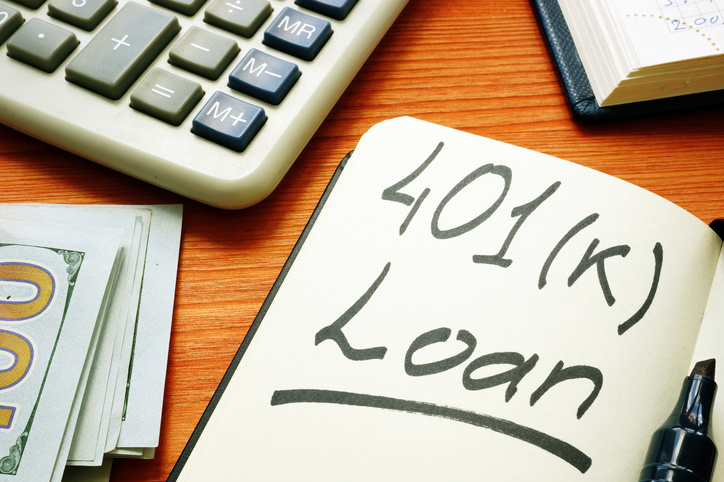A 401(k) loan does not appear on your credit report because it isn’t considered a loan from a third-party lender. When you borrow from your 401(k), you’re borrowing your own money. As such, it isn’t subject to credit checks or reporting requirements. That said, missing payments or defaulting on the loan can lead to tax consequences and potential penalties, as the IRS will treat the unpaid balance as a taxable distribution.
A financial advisor can help you manage debt and plan for retirement. Connect with a fiduciary advisor for free.
What Is a 401(k) Loan?
A 401(k) loan allows participants to access part of their retirement savings without permanently withdrawing funds. When you take out this type of loan, you’re essentially borrowing from yourself, and any interest paid goes back into your own account rather than to a bank or outside lender.
Many 401(k) plans let participants borrow up to half of their vested balance, with a maximum loan of $50,000, typically repaid through automatic payroll deductions over about five years.
The main appeal of a 401(k) loan lies in its simplicity and accessibility. There’s no credit check and no application process with a lender. Further, interest rates are often lower than what you might find with personal loans or credit cards.
That said, borrowing from your retirement account can reduce your potential investment growth while the loan is outstanding. If you leave your job before fully repaying the loan, the remaining balance often becomes due quickly, and the IRS may treat it as a taxable withdrawal if it’s not repaid.
Why 401(k) Loans Don’t Show Up on Your Credit Report

A 401(k) loan isn’t traditional debt because it doesn’t involve a creditor or financial institution extending you credit. Instead, the transaction takes place entirely within your employer-sponsored retirement plan, meaning it bypasses the standard credit system. For this reason, 401(k) loans are not reported to credit bureaus like Equifax, Experian or TransUnion, and they have no impact on your credit utilization ratio, credit mix or payment history.
Since there’s no hard inquiry when you take a 401(k) loan, your credit score won’t experience the temporary dip that typically accompanies new credit applications. However, the lack of reporting cuts both ways: Making timely payments on your 401(k) loan won’t improve your credit score either, as those payments remain private to your plan administrator.
Even if the loan goes unpaid, it still won’t show up on your credit report. However, the remaining balance will be treated as a taxable distribution, potentially triggering both income taxes and an early withdrawal penalty if you’re under age 59 ½.
What Shows Up on Your Credit Report
A credit report reflects your history of borrowing, repayment and overall credit management. The main categories that appear on it include:
- Credit accounts: This includes credit cards, mortgages, auto loans, student loans and personal loans. Each entry shows the lender’s name, account type, balance or credit limit, payment history and account status (open or closed).
- Payment history: In this section, you will see whether you’ve made past payments on time or late. Late or missed payments can stay on your report for up to seven years, while consistent on-time payments build a positive record.
- Credit inquiries: When you apply for credit, lenders perform a hard inquiry. These inquiries are visible to other lenders and may cause a temporary dip in your credit score.
- Public records and collections: These may include bankruptcies, foreclosures, civil judgments and debts turned over to collection agencies. These entries typically have the most negative impact on credit standing.
- Credit utilization: Your credit utilization tracks how much of your available revolving credit you are using. High utilization, generally above 30%, can lower your credit score. Lower utilization, on the other hand, tends to reflect more responsible credit management.
Pros and Cons of a 401(k) Loan
A 401(k) loan can provide quick access to funds, but it also carries trade-offs that can affect long-term savings. The table below outlines the key advantages and disadvantages.
| Pros | Cons |
|---|---|
| No credit check: Since you’re borrowing from your own account, approval doesn’t depend on your credit history or score. | Reduced investment growth: Money borrowed is temporarily removed from your investments, limiting potential compounding returns. |
| Lower interest rates: The interest rate is typically lower than what you’d pay on credit cards or unsecured personal loans. | Repayment risks: If you leave your job before repaying the loan, the remaining balance may be due immediately or taxed as a distribution. |
| Interest paid to yourself: Repayments, including interest, go back into your 401(k) rather than to a lender. | Tax consequences for default: Failure to repay a 401(k) loan can trigger income taxes and a 10% early withdrawal penalty if you’re under age 59 ½. |
| No impact on credit report: Borrowing or repaying a 401(k) loan doesn’t appear on your credit report. | Double taxation on interest: Loan repayments are made with after-tax dollars, and you’ll pay taxes again when you withdraw the funds in retirement. |
Bottom Line

A 401(k) loan does not appear on your credit report because it is not traditional debt. The money comes from your own retirement account, so no lender reports the transaction to credit bureaus. This means your credit score remains unchanged whether you repay the loan on time or fall behind. However, defaulting can still carry financial consequences since taxes and penalties may apply on the unpaid balance, even though it never shows up on your credit record.
Tips for Managing Retirement Savings
- A qualified financial advisor can help you design an investment strategy tailored to your goals, adjust it as your circumstances change and identify tax-efficient ways to draw income in retirement. Finding a financial advisor doesn’t have to be hard. SmartAsset’s free tool matches you with vetted financial advisors who serve your area, and you can have a free introductory call with your advisor matches to decide which one you feel is right for you. If you’re ready to find an advisor who can help you achieve your financial goals, get started now.
- As you get closer to retirement, gradually shift toward more conservative investments to preserve capital. Periodic rebalancing ensures your portfolio continues to match your goals and risk tolerance.
Photo credit: ©iStock.com/designer491, ©iStock.com/insta_photos, ©iStock.com/Inside Creative House
Read the full article here














